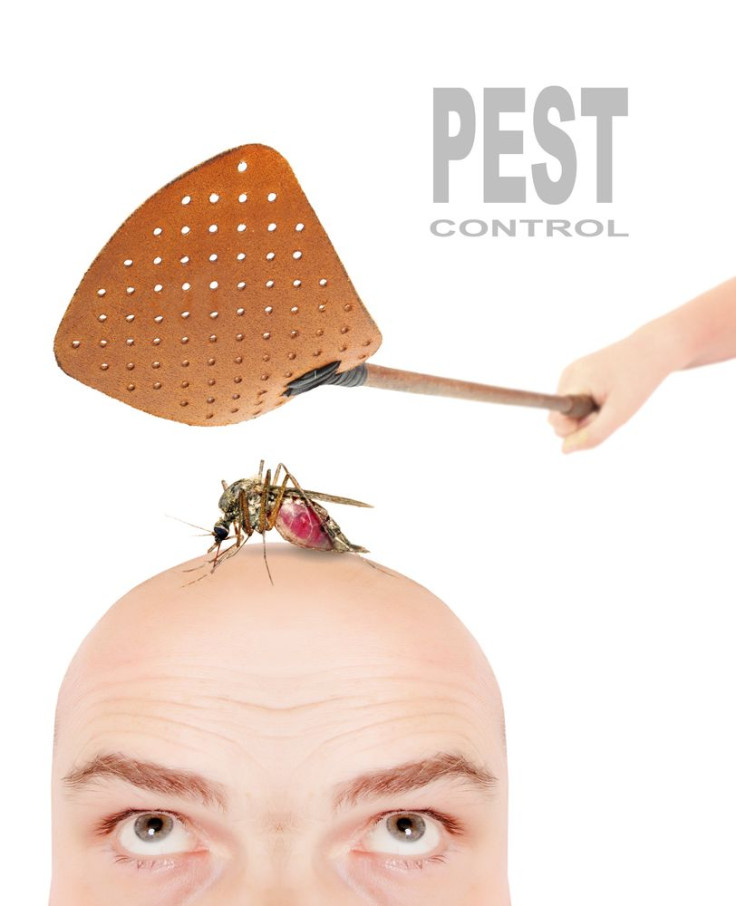Malaria Eradication? Scientists Modify Mosquito Sperm To Produce Only Male Offspring; New Approach To End Transmission

"If you can’t beat them, modify them" seems to be the new mantra for a group of scientists who have come up with an unusual solution for the malarial mosquito menace. For the first time, a team from Imperial College London has applied a novel genetic method to mosquito sperms that will ensure that only male offsprings are produced, completely eliminating the female line that spreads malaria, according to a press release.
In mosquitos, it’s the females that are carriers of the malarial parasite and their bite passes on the infection to humans while males typically feed on nectar and other sources of sugar. So the best solution would be to completely eradicate female mosquitos. Over the decades, a number of methods have been tried to control the mosquito population ranging from pesticides to biocontrols. Although large scale use of these methods have succeeded in reducing global malaria mortality rates by 42 percent since the year 2000, the poorest regions in the world still succumb to this disease. The spread of pesticide-resistant mosquitos, antibiotic-resistant parasite, and the difficulty in recognizing the symptoms have resulted in over 627,000 dying and approximately 3.4 billion people being at risk of contracting malaria each year.
In the new study, which has been published in the journal Nature Communications, scientists have tried to control the female population in the mosquito species Anopheles gambiae, one of the most common species to spread the parasite, Plasmodium falciparum. In order to ensure that the offsprings were exclusively male, the scientists inserted a DNA-cutting enzyme called I-PpoI into the mosquitos. I-PpoI works by cutting the DNA at precisely located sites so that homogenous fragments are formed rather than random pieces of DNA. When introduced in the mosquito, the enzyme cuts the X chromosome from the DNA in the sperm. Normally, X chromosomes present in the sperm produce female offsprings and the Y chromosome produce male offsprings. But with the absence of the X chromosome in the sperm of the mosquito, its progeny were all male.
It took the scientists six years to produce a variant of the enzyme, which successfully cleaved the DNA at the desired location and the first laboratory tests created a fully fertile mosquito strain that produced 95 percent male offspring.
The scientists further tested the effect of the genetically modified mosquitos on subsequent generations, by introducing them to five caged wild-type mosquito populations. In four of the five cages, the entire population was eliminated within six generations, because of the lack of females.
In a press release, lead researcher Professor Andrea Crisanti from the Department of Life Sciences at Imperial College London said, "Malaria is debilitating and often fatal and we need to find new ways of tackling it. We think our innovative approach is a huge step forward. For the very first time, we have been able to inhibit the production of female offspring in the laboratory and this provides a new means to eliminate the disease."
Coresearcher Dr. Nikolai Windbichler said, "What is most promising about our results is that they are self-sustaining. Once modified mosquitoes are introduced, males will start to produce mainly sons, and their sons will do the same, so essentially the mosquitoes carry out the work for us."
This promising new work of controlling mosquito populations by distorting the sex ratio may also eliminate the need for using harmful chemicals like DDT.
"The research is still in its early days, but I am really hopeful that this new approach could ultimately lead to a cheap and effective way to eliminate malaria from entire regions. Our goal is to enable people to live freely without the threat of this deadly disease", concluded Dr. Roberto Galizi from the Department of Life Sciences at Imperial College London.
Source: Crisanti A, Galizi R, Doyle LA, et al. A synthetic sex ratio distortion system for the control of the human malaria mosquito. Nature Communications. 2014.



























